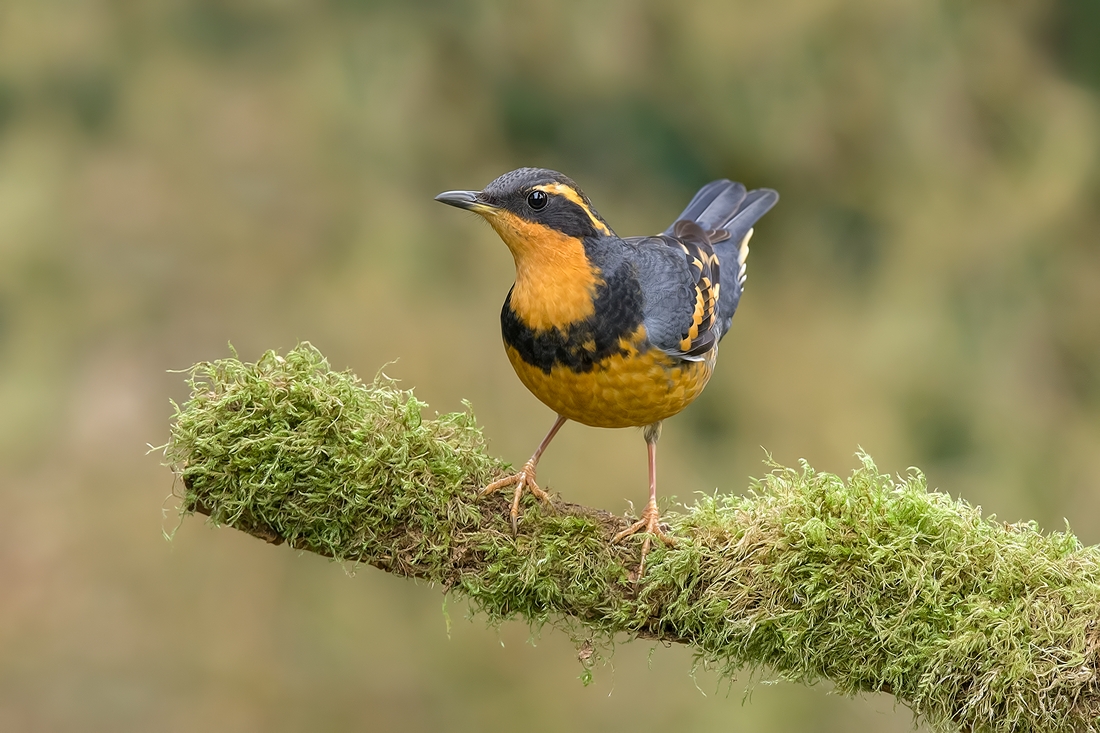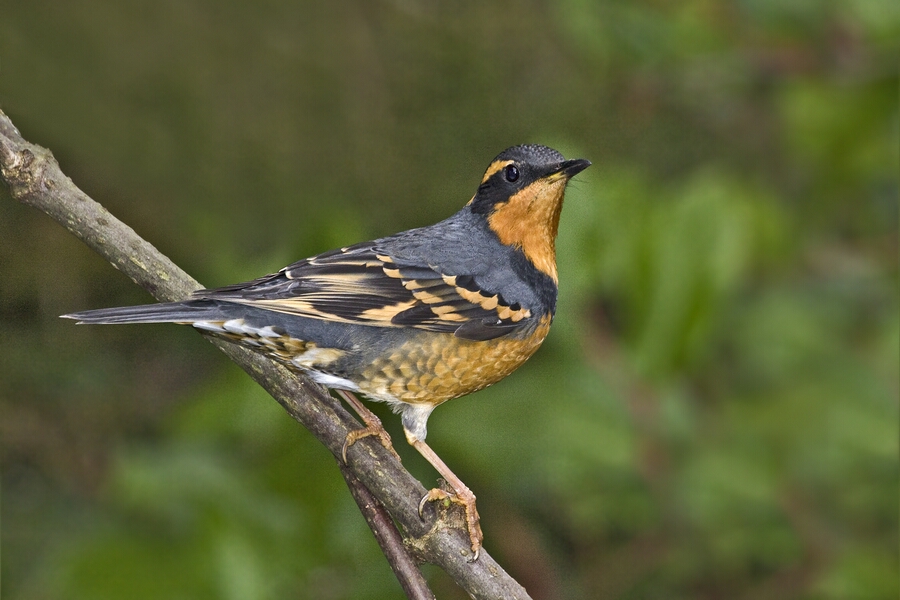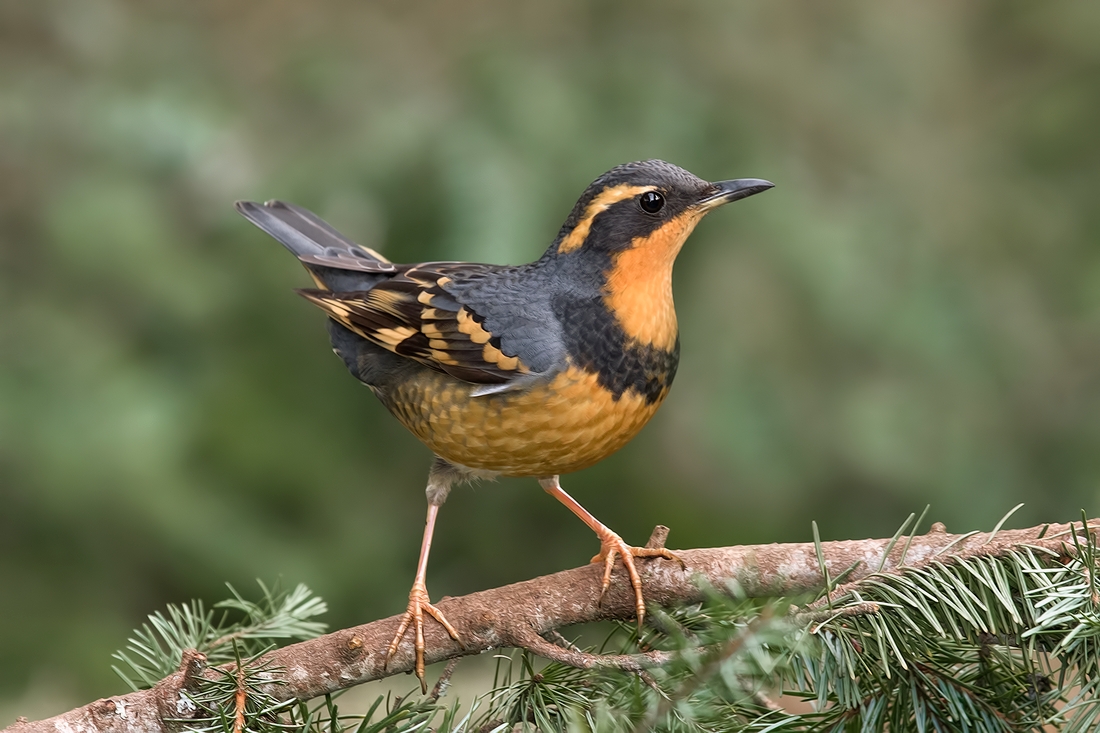.
Varied Thrush (Zoothera naevia) (male), Skagit Wildlife Area: photo by Walter Siegmund, 15 January 2007
On longer evenings,
Light, chill and yellow,
Bathes the serene
Foreheads of houses.
A thrush sings,
Laurel-surrounded
In the deep bare garden,
Its fresh-peeled voice
Astonishing the brickwork.
It will be spring soon,
It will be spring soon --
And I, whose childhood
Is a forgotten boredom,
Feel like a child
Who comes on a scene
Of adult reconciling,
And can understand nothing
But the unusual laughter,
And starts to be happy.

Varied Thrush (Zoothera naevia) (male), Black Creek, Northern Vancouver Island, British Columbia: photo by Elaine R. Wilson, 2011

Varied Thrush (Zoothera naevia) (male), Black Creek, Northern Vancouver Island, British Columbia: photo by Elaine R. Wilson, 2011

Varied Thrush (male), Black Creek, Northern Vancouver Island, British Columbia: photo by Elaine R. Wilson, 2011

Varied Thrush (Zoothera naevia) (male), Skagit Wildlife Area: photo by Walter Siegmund, 2006
Philip Larkin: Coming, 25 February 1950, from XX Poems, 1951
This early Larkin poem, writ while the poet was still in his tender twenties (aetat. 28), is characteristic of his signature theme of the period -- "a puzzled yet irremediable and somewhat satisfactory isolation" as John Updike once usefully designated it. The shy, sensitive "private" side, peeking out tentatively in this poem, walled-over later, here commands the moment of hope in anticipation of seasonal change with a level, ruminative voice that recalls that of early lyrical-ballads Wordsworth.
ReplyDeleteAh, "Poets in their youth..."
In a 1964 interview with the Beeb, Larkin talked about "Coming".
"The most difficult kind of poem to write is the expression of a sharp uncomplicated experience, the vivid emotion you can't wind yourself into slowly but have to take a single shot at, hit or miss. Some fifteen years ago in February, I heard a bird singing in some garden when I was walking home from work: after tea I tried to describe it, and after supper revised what I had written. That was the poem, and I must say I have always found it successful. It is called 'Coming' -- what is coming, I suppose, is Spring."
At the time of composition Larkin was working as an assistant librarian at University College, Leicester.
The poem's "scene of adult reconciling" possibly (??) occurred at 2 Poultney Road, Radford Garden Village, Coventry, home of the Larkin family from 1919 to 1925. Well, the lad would have only just turned three in 1925, but one knows the problem with recovered and buried members, er memories, and imagines the small, bewildered, yet already alert and anxious Philip stumbling into, or more like, eavesdropping upon, some such scene, there, in Coventry. His father, the Coventry City Treasurer, around this posited time in "nihilistically disillusioned middle age", would later make two pilgrimages to Nuremberg to attend the mass rallies of The Failed Artist. With such a paterfamilias, small wonder the son should turn out a bit... would the word be ingrown? ("They fuck you up, your mum and dad. / They may not mean to, but they do," PL would write in 1971 in "This Be The Verse", a bitter parody of R.L. Stevenson's "Requiem".)
It should be confessed that in this posting there is a deliberate yet hopefully not too ungrateful misuse of the bird in the poem. The laurel-surrounded thrush with the fresh-peeled voice in the deep bare garden in Larkin's poem was doubtless of the species Turdus merula, or Common Eurasian Blackbird, the male of which is notable for its rich melodious song. But good looks, not so much. For this bird I have willfully substituted several brilliant photos of the Varied Thrush (Zoothera naevia), a New World species native to the coniferous forests of the North American West Coast from Alaska down to Northern California. From later February into early March the extremely handsome male of this species announces Spring with a song so thrilling as to pierce an ancient heart of stone. And none too soon for that. When this little guy offers his three piercing calls, separated by significant pauses in which the world must remake itself anew in order to catch up with its own beauty, you'd think the whole woodland would be silenced. But instead of course the ambient chatter goes on unabated, (non)business as usual.
You might even wish to give a listen, should you have a moment.
Varied Thrush (zoothera naevia) heralds Spring in Willamette Valley (Southwest Corvallis)
Short of the song itself (which you have thoughtfully supplied), this will do very nicely, indeed.
ReplyDeleteA fine, fine bit of poesy, you catch the rhythm and measure right away (amazing, in such brief lines) and it doesn't let go ...
Out here in Pittsburgh (average temperature 40) we are in the midst of a run of 10 days in the 70s (high 70s the last few days) and spring has been instantaneous, in a way which is almost frightening. Flowers and trees which would be unveiled over a two week period have all simultaneously sprung out in 3 days and it is very disconcerting.
Lovely to have them all but it seems they will be gone before we know it.
Don
PS Blogger seems to have done away with the subscribe to comments feature, which I always did with your posts. It always helped to remind me to check back in on the conversation and I miss that (because I sometimes forget to check back).
Don, the genius of the house had sunk her modest hopes in five tender daffodil bulbs which had just produced blooms a few days before the utility company arrived bright and early yesterday to submerge them in the drill-rig excavation that preceded the installation of a new power pole the size of a Cold War Era missile.
ReplyDeleteAbout the follow-up comments function disappearing, that's disappointing, demoralizing, discouraging and depressing. And what's really strange: I had, coincidentally, while you were commenting here, been over at your place, commenting, and privately lamenting anew there (to myself of course) that the follow-up comments function has disappeared at your place!
Jeez, what elfin antix next, I esk ya?!
Truly the idiotic whims of the bots and pixies that flit through our Boiler Rooms like so many Casper the Ghosts do weigh upon my soul.
(In that ton-of-feathers blog-futility-oblivion way we all know and don't love.)
More likely the Song Thrush Tom Not Turdus merula but Turdus philomelos See/hear here:
ReplyDeletehttp://www.bbc.co.uk/nature/life/Song_Thrush
A really enjoyable post thanks
Is it just me or doesn't this guy just about write the perfect poem?
ReplyDeleteDal,
ReplyDeleteI reckon you are right. And that particular Song Thrush is in very fine voice.
In return, here is another appreciable vocalist from Tayside:
A Song Thrush in Perth & Kinross.
Though we might wish to consider, too, Thomas Hardy's Mistle Thrush (Turdus viscivorous) on that coppice-gate in darkling Wessex.
Conrad,
It seems, from this, it's not just you!
I love this post--not sure which part I like best. The poem, the comments --the nihilistically disillusioned middle age and the mum and dad who fuck you up, even if they don't mean to -- or the bird substitutions and songs . . .
ReplyDeleteAnd yes, it is way too hot here for the season, and I am not a fan at all. I think I must be the only curmudgeon in town who is unhappy with temperatures in the 80s and the blooming trees as if this were South Carolina. We will have bug infestations like never before, I growl, which means more and more pesticides in the corn belt . . .
which means I should shut up before I say another word.
Tom,
ReplyDeleteYes, as Don says, "this will do very nicely, indeed" -- as invocation to the coming of spring (in whatever temperatures it comes, wearing whatever weather), also as Larkin's memory of coming into "a scene Of adult reconciling" in what your comments suggest might well have become an otherwise sadness of childhood, and also as these lovely songs of such varied tuneful thrushes.
Some lovely skies here this morning, as you can 'see' in the photo posted w/ this poem on my site (stephenratcliffe.blogspot.com) --
3.21
light coming into clouds above shadowed
ridge, whiteness of flower beside fence
in foreground, sound of wave in channel
scene of figure in what was
action, appeared most
again, demonstrates what it
is, that “which here”
grey white clouds reflected in channel,
shadowed green slope of ridge above it
Thanks Tom A thrush from very close to where I went to school and grew up (?) - a little place called Dollar
ReplyDeleteYes I had already dug out the Hardy poem to re-read That bird didn't care how old or young it was ......
The ambient chatter here right now is of the many frogs and crazed ducks in the wetlands behind the house . . . and a ginger tabby snoring
ReplyDeleteSad that Larkin's childhood was so boring and forgettable Arguably the one "off" note in the whole poem
Nin, it's the opposite form of world-upside-down climate change here, cold, wet, wet, cold and more than somewhat cur-mudging.
ReplyDeleteAh to look back with rose-coloured nostalgia at mere nihilistically disillusioned middle age!
Steve, speaking of nostalgia -- that's a gorgeous photo of your sacred precincts, there, today.
Dal, lovely the frogs and ducks... you're hard by the coast, then? And excellent company is a sleeping ginger tabby. (Three cats here, a brother & sister pair venerable & sleepy, and an irrepressible live-wire who's always on the move and into everything...)
About that forgotten childhood of Larkin's, one suspects that elements of strategic repressing and denying, as well as of embarrassment and discretion, might well be ingredients in that blurry mixed stew. As perhaps for many people. Still there's the question of whether a memorably blissful childhood might have produced -- well, a happier adult person, no arguing that -- but a poet of such interesting dimensions.
(In any case, ultimate outcomes aside, that little place called Dollar sounds from this vantage far happier than the fancied-up council house in the "better part" of Coventry.)
This comment has been removed by the author.
ReplyDeleteWell, it's all a swamp out there, up hill, over dale
ReplyDelete... and beyond the blasted heath it deepens, like a coastal shelf...
... and as to "where my childhood was unspent".
ReplyDeleteThis one "isn't him"... though then again...
And you will note the bracken reference.
Two of the three felines asleep here too, how lovely it would be to join them.
Perhaps a happy childhood would be the key to restful slumber later.
My own playground by the by was an alley behind an apartment block -- narrow and stinking, though perhaps not so much so as was the case in this enclosed (foreclosed?) version of Arcadia:
Tight Spaces (Thomas Annan: The Old Closes and Streets of Glasgow).
You mentioned Wordsworth Tom and a friend was having trouble sleeping and overnighted this to me -
ReplyDeleteA flock of sheep that leisurely pass by,
One after one; the sound of rain, and bees
Murmuring; the fall of rivers, winds and seas,
Smooth fields, white sheets of water, and pure sky;
I have thought of all by turns, and yet do lie
Sleepless!
I like the way it really doesn't make sense ... and then it does
That's brilliant.
ReplyDeleteThis comment has been removed by the author.
ReplyDeleteYes, I can feel it from this distance.
ReplyDeleteI suspect the Song Thrush is being evoked. It repeats its phrases, hence the
ReplyDelete"It will be spring soon/
It will be spring soon".
The poem shifts to the view point of the speaker who anticipates the advent of spring. The phrase – “It will be spring soon” is repeated twice to give impetus to the joy of the speaker. This kind of reiterating is done by children who feel happy or when playing. The poet cleverly confesses that he is trying to reconcile with the child within. As an adult, he cannot remember the days of joy and feels that his childhood is monotonous. He cannot come to a reconciling moment but feels happy for no reason. Despite the absence of understanding, which is a bit pessimistic, Philip Larkin creates an emotional mixture of hope, joy and optimism with the ending. Sula is BETTER!!
ReplyDelete